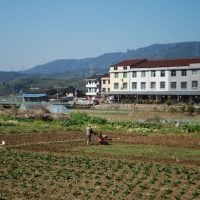Food security remains one of the most pressing global challenges of our time, affecting millions of people across various regions. Defined as the state in which all people have physical, social, and economic access to sufficient, safe, and nutritious food, food security is intricately linked to health, education, and economic stability. Despite advancements in agricultural technology and food distribution systems, many communities still grapple with hunger and malnutrition.
Factors such as climate change, conflict, economic instability, and the COVID-19 pandemic have exacerbated these challenges, leading to increased food insecurity worldwide. The statistics are alarming: according to the Food and Agriculture Organization (FAO), nearly 690 million people were undernourished in 2019, a number that has only risen in the wake of the pandemic. The situation is particularly dire in low-income countries where access to food is often limited by poverty and lack of infrastructure.
Moreover, the intersection of food security with other global issues—such as gender inequality and environmental degradation—compounds the problem, making it imperative for organizations to adopt a multifaceted approach to tackle these challenges effectively.
Importance of NGOs in Addressing Food Security
Non-governmental organizations (NGOs) play a crucial role in addressing food security challenges by implementing innovative solutions and advocating for policy changes. These organizations often operate at the grassroots level, allowing them to understand the unique needs of communities they serve. By working closely with local populations, NGOs can tailor their interventions to address specific issues such as malnutrition, agricultural productivity, and access to markets.
Their ability to mobilize resources and engage volunteers also enables them to respond quickly to crises, providing immediate relief to those in need. Moreover, NGOs often serve as a bridge between communities and government agencies or international organizations. They can advocate for policies that promote food security and ensure that the voices of marginalized populations are heard.
For instance, NGOs can lobby for better agricultural practices or improved social safety nets that protect vulnerable groups from food insecurity. By fostering partnerships with various stakeholders—including local governments, businesses, and other NGOs—these organizations can create comprehensive strategies that address the root causes of food insecurity while promoting sustainable development.
Overview of Grants for NGOs
Funding is a critical component for NGOs working in the field of food security. Various grants are available from government agencies, international organizations, and private foundations aimed at supporting innovative projects that address hunger and malnutrition. These grants can provide essential financial resources for NGOs to implement programs that improve agricultural practices, enhance food distribution systems, or develop educational initiatives focused on nutrition.
For example, the United States Agency for International Development (USAID) offers grants through its Feed the Future initiative, which aims to reduce global hunger and poverty by promoting sustainable agricultural practices. Similarly, the World Food Programme (WFP) provides funding opportunities for projects that enhance food security in vulnerable communities. Additionally, private foundations like the Bill & Melinda Gates Foundation offer grants for innovative solutions that leverage technology to improve food production and distribution.
Understanding the landscape of available funding is crucial for NGOs seeking to expand their impact in addressing food security challenges.
Criteria for Eligibility and Application Process
While numerous grants are available for NGOs focused on food security, each funding opportunity comes with specific eligibility criteria and application processes. Typically, NGOs must demonstrate their capacity to implement effective programs, including a clear understanding of the local context and a proven track record of success in similar initiatives. Many funders also require organizations to have a robust monitoring and evaluation framework in place to assess the impact of their projects.
The application process often involves submitting a detailed proposal outlining the project’s objectives, methodology, budget, and expected outcomes. It is essential for NGOs to articulate how their proposed solutions align with the funder’s priorities and goals. Additionally, many grant applications require letters of support from local partners or stakeholders to demonstrate community engagement and collaboration.
As such, NGOs should invest time in building relationships with potential partners before applying for funding to strengthen their proposals.
Examples of Innovative Food Security Solutions
Innovative solutions are essential for addressing the complex challenges of food security effectively. One notable example is the use of mobile technology to improve agricultural practices among smallholder farmers. Organizations like Digital Green have developed platforms that enable farmers to access information on best practices through videos shared via mobile phones.
This approach not only enhances farmers’ knowledge but also fosters community engagement by allowing them to share their experiences and learn from one another. Another innovative solution is urban agriculture initiatives that transform underutilized spaces into productive gardens. For instance, organizations like Growing Power in Milwaukee have successfully implemented urban farming projects that provide fresh produce to local communities while also creating jobs and promoting environmental sustainability.
These initiatives not only address food insecurity but also contribute to community resilience by fostering local economies and reducing reliance on external food sources.
Impact and Success Stories of NGOs
The impact of NGOs working on food security can be profound, with numerous success stories highlighting their contributions to improving lives. One such example is the work of Heifer International, which has empowered communities by providing livestock and training in sustainable farming practices. By equipping families with resources and knowledge, Heifer has helped thousands escape the cycle of poverty while ensuring they have access to nutritious food.
Another inspiring story comes from Action Against Hunger, which has implemented nutrition programs in various countries facing severe food insecurity. Their comprehensive approach includes not only immediate relief efforts but also long-term strategies aimed at improving agricultural productivity and health education. The organization’s work has led to significant reductions in malnutrition rates among children in affected regions, showcasing the transformative power of targeted interventions.
Challenges and Barriers in Implementing Innovative Solutions
Despite the potential for innovative solutions to address food security challenges, NGOs often face significant barriers in implementation. One major challenge is securing sustainable funding for long-term projects. Many grants are short-term or project-based, making it difficult for organizations to maintain momentum once initial funding runs out.
This can lead to disruptions in services or a lack of continuity in community engagement efforts. Additionally, bureaucratic hurdles can impede progress. Navigating complex regulatory environments or obtaining necessary permits can slow down project implementation.
Furthermore, cultural barriers may arise when introducing new agricultural practices or technologies that differ from traditional methods. To overcome these challenges, NGOs must engage with local communities early in the process, ensuring that solutions are culturally appropriate and supported by those they aim to help.
Future Opportunities and Funding Trends
Looking ahead, there are promising opportunities for NGOs working on food security as funding trends evolve. Increasing recognition of the interconnectedness between climate change and food systems has led to a growing emphasis on sustainable agricultural practices. Funders are increasingly interested in supporting projects that incorporate climate resilience into their strategies, creating opportunities for NGOs that prioritize environmental sustainability alongside food security.
Moreover, there is a rising trend towards collaborative funding models that encourage partnerships among NGOs, businesses, and government entities. These collaborations can leverage diverse resources and expertise to create more comprehensive solutions to food insecurity. As technology continues to advance, there will also be opportunities for NGOs to explore innovative approaches such as blockchain for supply chain transparency or artificial intelligence for predictive analytics in agriculture.
In conclusion, while food security challenges persist globally, NGOs play a vital role in addressing these issues through innovative solutions and community engagement. By understanding funding opportunities and navigating eligibility criteria effectively, organizations can secure resources necessary for impactful projects. As they continue to adapt to emerging trends and overcome barriers, NGOs will remain at the forefront of efforts to ensure that all individuals have access to sufficient and nutritious food.
In the realm of addressing food security challenges, NGOs are constantly seeking innovative solutions to ensure sustainable food systems. A related article that might be of interest is the “Innovation Exchange Challenge: Gas Sampling in a Sealed Environment (UK),” which explores technological advancements in environmental monitoring. This challenge encourages the development of innovative methods for gas sampling, which can have significant implications for food storage and preservation, ultimately contributing to food security. For more information, you can read the full article by following this link.









































